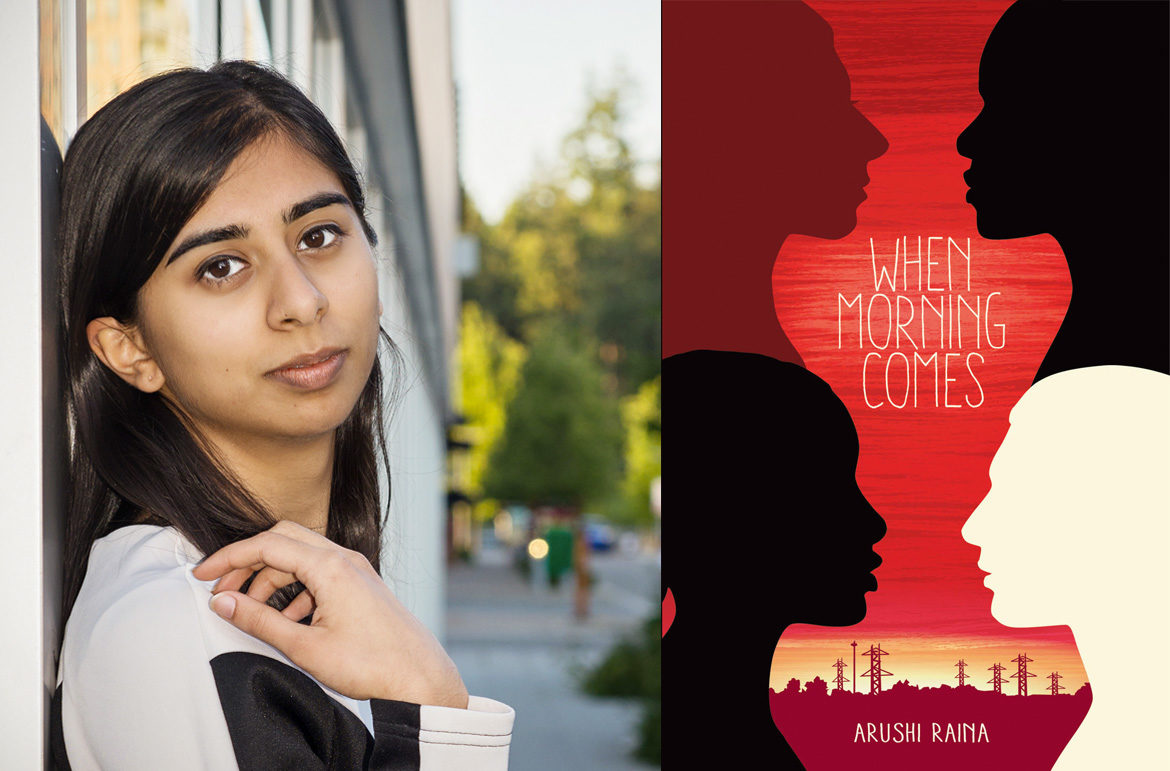Arushi Raina‘s debut novel has received numerous glowing reviews and was a finalist for the 2017 Canadian Children’s Book Centre Awards for Historical Fiction. Told from four very different perspectives, When Morning Comes (Tradewind Books) explores the roots of the Soweto Uprising in Johannesburg in 1976, and the edifice of Apartheid in a South Africa about to explode. The Globe & Mail said, “it has an in-the-moment, documentary feel that puts historical realism and authenticity first.”
Read Local BC caught up with Arushi Raina amidst her busy fall itinerary to hear about her journey as an author, her characters, and her literary inspirations.
What genre(s) do you write in and how did you get started?
Young adult and adult literary. When I started, I was very specific about genre, but more and more, I find it sort of irrelevant, or less useful than considering the type of reader you want to read your book.
I got started writing when I was 16 on our old desktop – with a very adverb- and adjective-laden fantasy book. It also featured four main characters. I think I’m sort of obsessed with the four character quartet type thing.
What was the impetus for your book?
The impetus was an image, followed by a very vivid character; a street painting of a man playing a sax in Downtown Johannesburg. Then, in my head, I saw a girl in a shebeen (club). She looked glamorous. But then I realized she couldn’t sing that well. So why was she in that club in the first place? Zanele was the first character I thought of and she made it into the pages.
I was lucky enough to connect publishers with a story that mattered, and that they cared about.
What challenges have you encountered in your journey as an author?
Writing is a tricky business. There’s first the journey of actually writing a half decent book (it took me around 7 years to do that) and then navigating the complex world of publishing. I’ve been getting rejection letters since I was 16—I think that I was lucky enough to connect publishers with a story that mattered, and that they cared about. And that only happens (for most) after knocking on a lot of doors.
What are the key qualities you want in a book, as a writer or a reader?
Flawed characters. We relate to humans we read of in fiction. Humans make mistakes. And complex, diverse characters too, even in teen fiction. Teens are different and complex and they deserve books that adequately portray that.
What’s the most memorable thing a reader has ever said to you?
The most interesting thing readers have told me, is about their favourite characters in the book. I didn’t realize that the four-person point-of-view would mean that readers would identify most with one of those points of views. All of my characters are flawed, but in different ways, and seeing different readers identify with different characters, either like them or completely unlike themselves (for example, my relatively conservative grandmother really identifying with my no-holds-barred, power-to-the-people character, Zanele, was a surprise).
Which book(s) have you reread most in your life?
Pride and Prejudice. There are a lot of layers and undercurrents in Austen prose, and every time I read the book, I find something new. I think the book is influencing my next book.
What book do you think is underappreciated?
The Chosen by Chaim Potok. A very quiet, important book. On Fortune’s Wheel by Cynthia Voigt. Ooh and also, Ruby in the Smoke by Philip Pullman.
If money weren’t an issue, where would you travel or who would you visit?
Johannesburg. It’s been a couple of years and I miss it.
Arushi Raina grew up in Johannesburg, South Africa. So far, Arushi’s also lived in Egypt, Nigeria, India, the US, UK, and most recently, Canada. At Vassar College in New York, Arushi studied Economics and English, where she was able to put together the beginnings of When Morning Comes. Besides writing, Arushi enjoys travelling, arguments, and long car rides. As a day job, Arushi works as a consultant. One day she’ll explain what that means.

